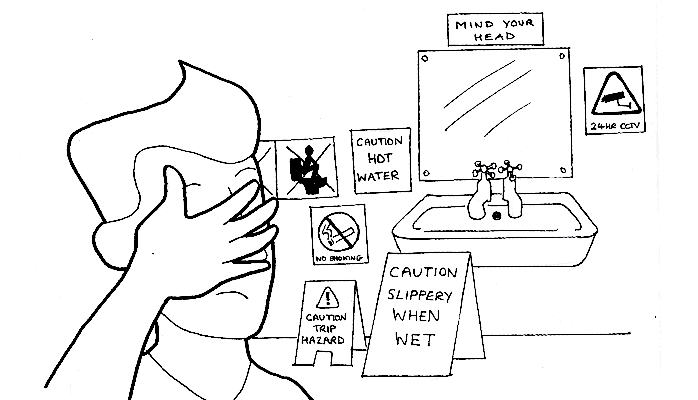For all the right reasons, large systems develop lots of checks and balances to prevent things going wrong. I look at governments and see huge amounts of time and energy being exerted, gaining permission for things before any change or action. It’s even worse in our world of 24-hour news and social media, where everything that goes wrong is made public and can be seen. It’s an impossible burden, doing things in these old ways.
Every time a mistake does occur, there’s a reaction that builds even more administration and complexity into what is already a big, slow, unwieldy system. This creates a lot of inertia.
In the case of governments, the public don’t want to see money wasted, so every penny is protected by hugely expensive bureaucracy. Large organisations are full of gatekeepers and gatekeeping processes. It is very hard for the person on the street to understand that the cost of maintaining the gate is often far more expensive than the cost of allowing occasional mistakes to occur.
The 1% (or even 0.1%) of the population’s risk management creates a huge cost for the other 99(.9)%. Consider what would be needed in society if everyone could be trusted 100% to do the right thing. How many of our current systems would be actually needed, if everyone could trust each other? Further, how many of our systems would still be required, if everyone worked together in the community to deliver everything we all needed?
The irony is – these cumbersome systems actively disengage people from providing the very support that would reduce the need for those systems to exist. Apathy is a western disease, and it is from mass disengagement that movements like populism rise.
Although some transition from ‘being governed’ to self governance is necessary in the long term, much can be done in the short term. We are seeing the power of networks removing the ‘middle people’ in most industries, right now. Government is essentially the intermediary of intermediaries – and it therefore needs to understand its role in our collective disengagement.
I use the term ‘Gatekeeper Mindset’ to demonstrate that so many of our systems are not enabling and to challenge that thinking. With such systems in place, it takes such effort to make change happen that many people give up. For all the right reasons, the gatekeeper mindset is there to protect large organisations, like government – but it often doesn’t understand what is lost, in the process.
Simple things can be done to make it easier.
The easy yes. Saying ‘no’ is often the easiest option, since it creates less work. But what if it took more work to say no than to say yes? Many innovative organisations develop time-consuming bureaucratic processes to get people to justify, at length, why they are saying no to a new idea or action. It takes far greater time and effort to refuse something, so the easiest thing to do is accept it. Increasing the cost of saying ‘no’ makes ‘yes’ happen more often.
Enable and empower. What if you dedicated resources to coaching and supporting people through the process? Very few organisations look at investing in skills and support to enable people through tougher governance. Investment in both should go hand in hand, to make things move faster.
One in, one out. What if every new rule meant that an old one had to be thrown away? Having specific and dedicated processes to reduce red tape make it much more likely that organisations will can stay nimble.
Dare to fail, and use the feedback What if we promoted the belief that making mistakes was OK? The cultural narrative around mistakes is one of zero tolerance, which is a shame, because most of us learn from our mistakes. The ‘crime’ is to consistently repeat the same mistakes, rather than to make them at all. ‘Trial and error’ informs progress. Developing a compassionate cultural narrative to encourage experimentation and celebrate the learning opportunity arising from any failure has real value.
Prototyping first. Adopting a ‘try it, test it and see’ approach allows for ideas, actions, products or services to be trialled and de-risked. To address the old ‘that won’t work here’ mindset, use a ‘tried and tested’ approach of your own. Ensure you have resources available to support lots of small trials to prove whether things can work or not, or to adapt and improve them.
Transparency, rather than regulation. Industry ratings of hotels and restaurants have been overtaken by crowd-based reviews on entities like Tripadvisor. Whilst these platforms are not perfect, they have done far more to raise standards than any bureaucratic process or regulatory standards. It’s important to be aware of the technologies and platforms now becoming available, in order to swap industry rules and regulations for public transparency.
Be aware that the Gatekeeper Mindset exists. It needs to be deliberately countered, which is the key to enabling more progress, over time. Whilst the power of networks and exponentially increasing transparency will create solutions for the future, we must be open to developing and using our own simple processes in the meantime.
To open gates.
Marc
Buy Me a Coffee
Did you love this article? If so please consider buying me a coffee.
Take The 50 Coffee Adventure
A Fun, Light and Easy Way to Build Connections
Or search your local Amazon store for "The 50 Coffee Adventure".

Speak Your Mind